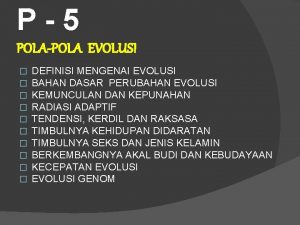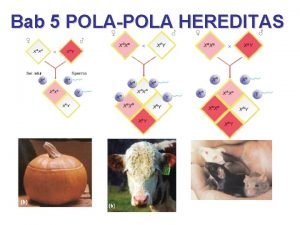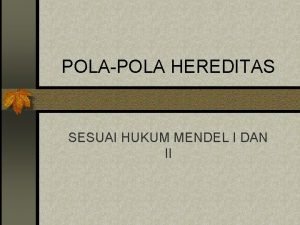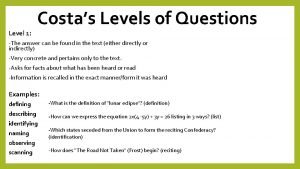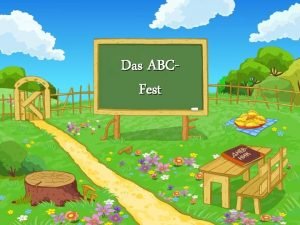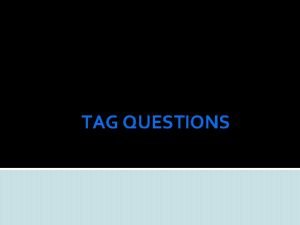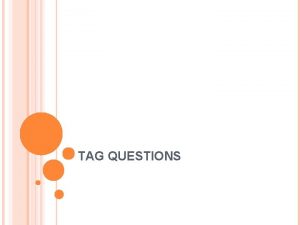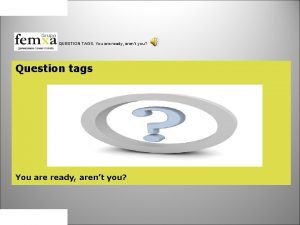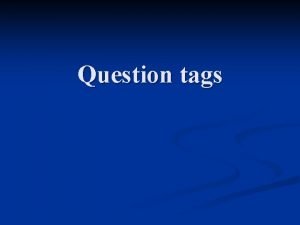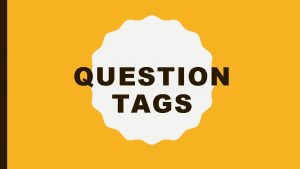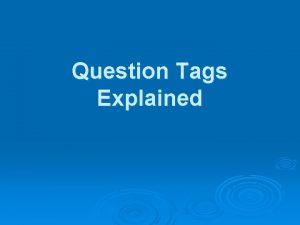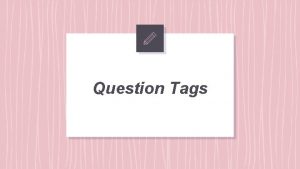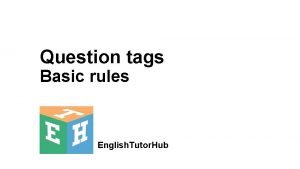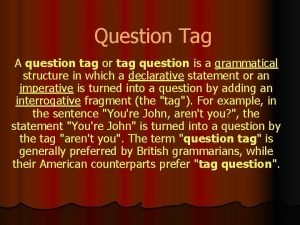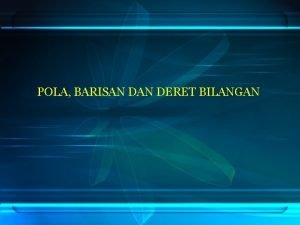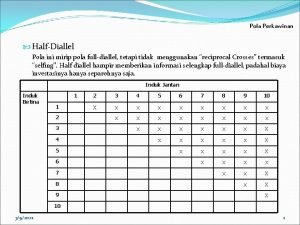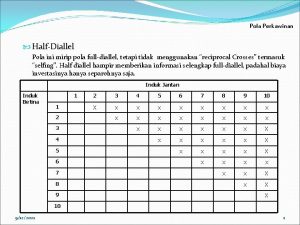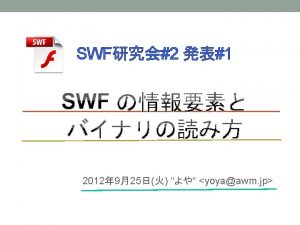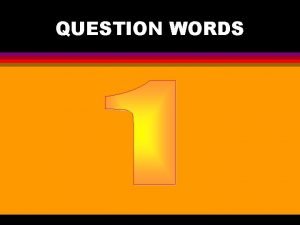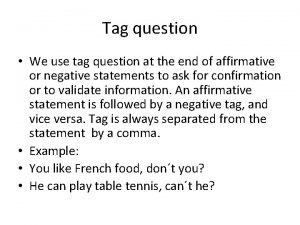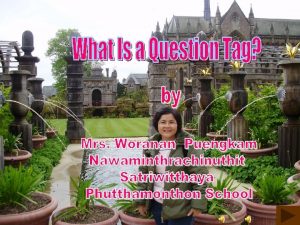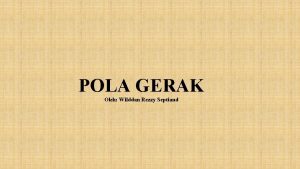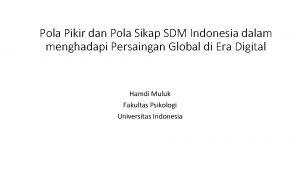QUESTION TAG What is Question Tag Adalah pola



















- Slides: 19

QUESTION TAG

What is Question Tag? Adalah pola kalimat khusus dalam Bahasa Inggris yang digunakan untuk meminta konfirmasi, persetujuan atau penegasan. Dalam bahasa Indonesia berupa pertanyaan “bukan”. Example: Ini baju ingin kamu beli, bukan?

Question tag ini berupa pernyataan (statement) yang diikuti oleh pertanyaan singkat (mini-question). Example: Rose is beautiful, isn’t it? Kalimat pernyataan pertanyaan penegas (question tag)

HOW TO MAKE IT? ?

1. Apabila pernyataanya positif (positive statement) diikuti oleh tag negatif (negative tag) Positive Statement (+) You are Diaz, Negative Tag (-) Meaning aren't you? Kamu Diaz, kan?

2. Apabilapernyataannyanegatif (negative statement) diikutioleh tag positif (positive tag). Negative Statement (-) Positive Tag (+) Arti John doesn't like does he? John tidaksuka coffee kopi, kan?

3. Kata “NOT” dalam Negative Tag selalu disingkat. Are not Aren’t Have not Will not Can not Should not Must not Do not Haven’t Won’t Can’t Shouldn’t Mustn’t Don’t

4. Gunakan personal pronoun (kata ganti nama) dalam question tag. Example: Lydia is sick, isn’t Lydia? Lydia is sick, isn’t she?

1. POSITIVE STATEMENT-NEGATIVE TAG NO POSITIVE STATEMENT (+) NEGATIVE TAG (-) 1 You are writing aren't you? 2 We have learned haven't we? 3 They will go to school won't they? 4 You should study shouldn't you? 5 She must go mustn't she? 6 He plays guitar doesn't he? 7 You study English don't you? 8 You played football didn't you?

Note » Untuk no 1 – 5, kita mengulang auxiliary yang diubah kedalam bentuk negatif. 1. Are → aren’t 2. Have → haven’t 3. Will → won’t 4. Should → shouldn’t 5. mustn’t

Note �» Untuk no 6, 7, 8 apabila kita tidak menemukan auxiliary dalam pernyataan tersebut, INGAT bahwa auxiliary untuk simple present adalah “do/does” dan auxiliary untuk simple past adalah “did”.

2. NEGATIVE STATEMENT-POSITIVE TAG NO NEGATIVE STATEMENT (-) POSITIVE TAG (+) 1 You aren't coming are you? 2 We haven't read it have we? 3 They won't go to school will they? 4 You shouldn't go should you? 5 She doesn't write a letter does she? 6 You don't speak Japanese do you? 7 You didn't arrive yesterday did you?

Note » Untuk no 1 – 9, kita mengulang auxiliary yang diubah kedalam bentuk positif. 1. Aren’t → are 2. Haven’t → have 3. Won’t → will 4. Shouldn’t → should 5. Doesn’t → does 6. Don’t → do 7. Didn’t → did

Special cases

a. Negative words (kata negatif) Never, Seldom, Hardly, Rarely, Barely, Scarcely, Nothing Nobody/No one Apabila suatupernyataan menggunakan salah satu dari kata tersebut, maka pernyataan tersebut merupakan pernyataan negatif (negative statement). Maka kita menggunakan tag positif (positive tag).

NEGATIVE STATEMENT (-) POSITIVE TAG (+) ARTI You never come to do you? Kamu tidak pernah datang this place We seldom washed ke tempat ini, kan? did we? the shoes You barely ever iya kan? do you? meet me Nobody calls me Kita jarang mencucis epatu, Kamu hampir tidak pernah bertemu aku, kan? do he? Tak seorangpun menghubungi saya, kan? Nothing came to this did it? Tak ada satupun yang inbox masuk ke inbox, ya kan?

b. Imperative (kalimatperintah) menggunakan tag “will you? ” – Close the door, will you? – Sit down, will you? – Don’t come late, will you? – Open the window, will you?

c. “I am” menggunakan tag “aren’t I? ” – I am wrong, aren’t I? – I am sad, aren’t I? – I am clever, aren’t I?

e. “Let’s” (let us) menggunakan tag “shall”. – Let’s go, shall we? – Let’s read, shall we? – Let’s write, shall we?
 Pola pola evolusi
Pola pola evolusi Sumber: pixabay.com
Sumber: pixabay.com Hipostasis dan epistasis
Hipostasis dan epistasis Pola pinggiran memanjat
Pola pinggiran memanjat Pola pola hereditas pada manusia
Pola pola hereditas pada manusia Costa's levels
Costa's levels How to write banter
How to write banter Ein neuer morgen ein neues leben
Ein neuer morgen ein neues leben Guten tag hallo wie gehts
Guten tag hallo wie gehts Oh shut up question tag
Oh shut up question tag Question tag imperative
Question tag imperative Nobody lives in this house question tag
Nobody lives in this house question tag Let's go question tag
Let's go question tag You are ready aren't you
You are ready aren't you Somebody tag question
Somebody tag question Question tag introduction
Question tag introduction Question tag if clause
Question tag if clause Don't smoke tag question
Don't smoke tag question Question tag definition
Question tag definition Question tag
Question tag
